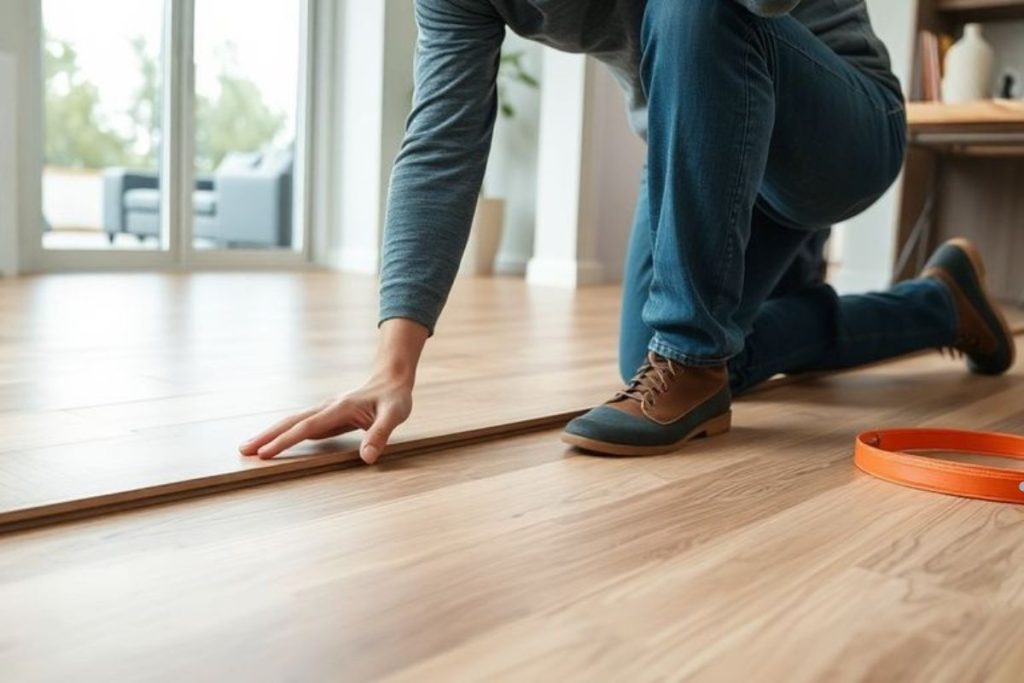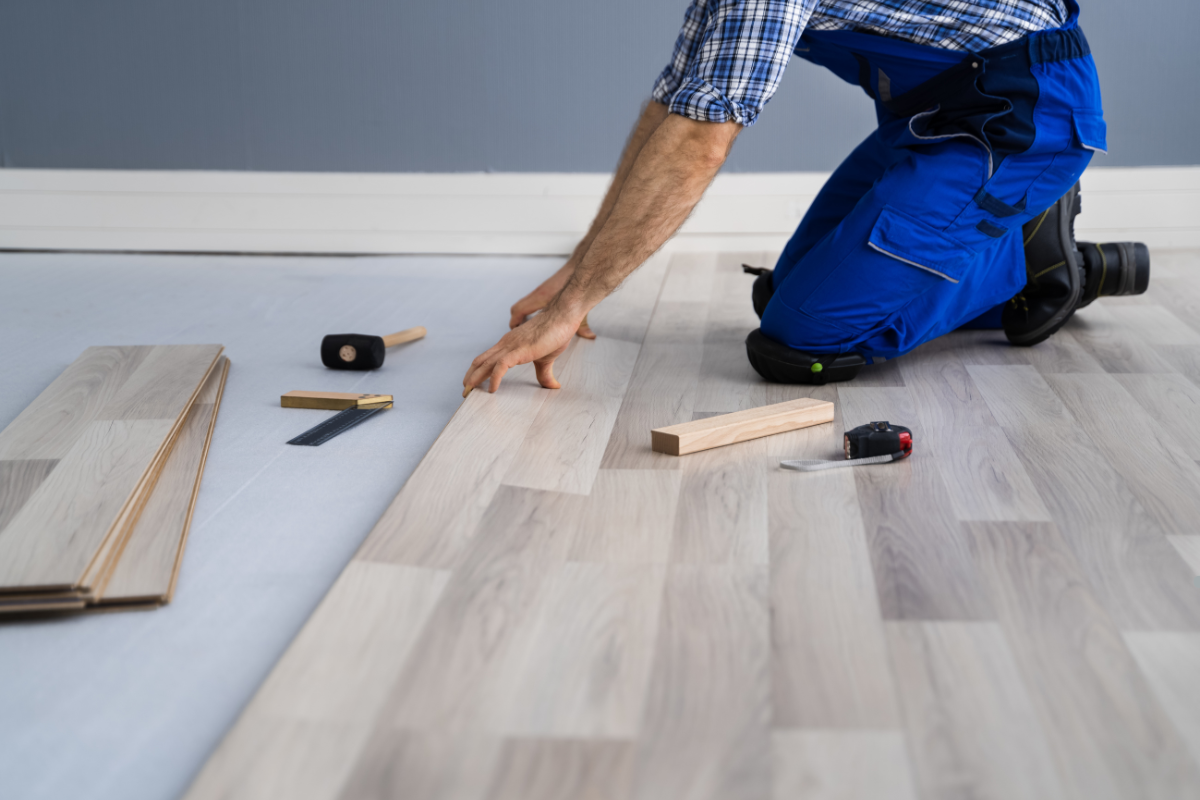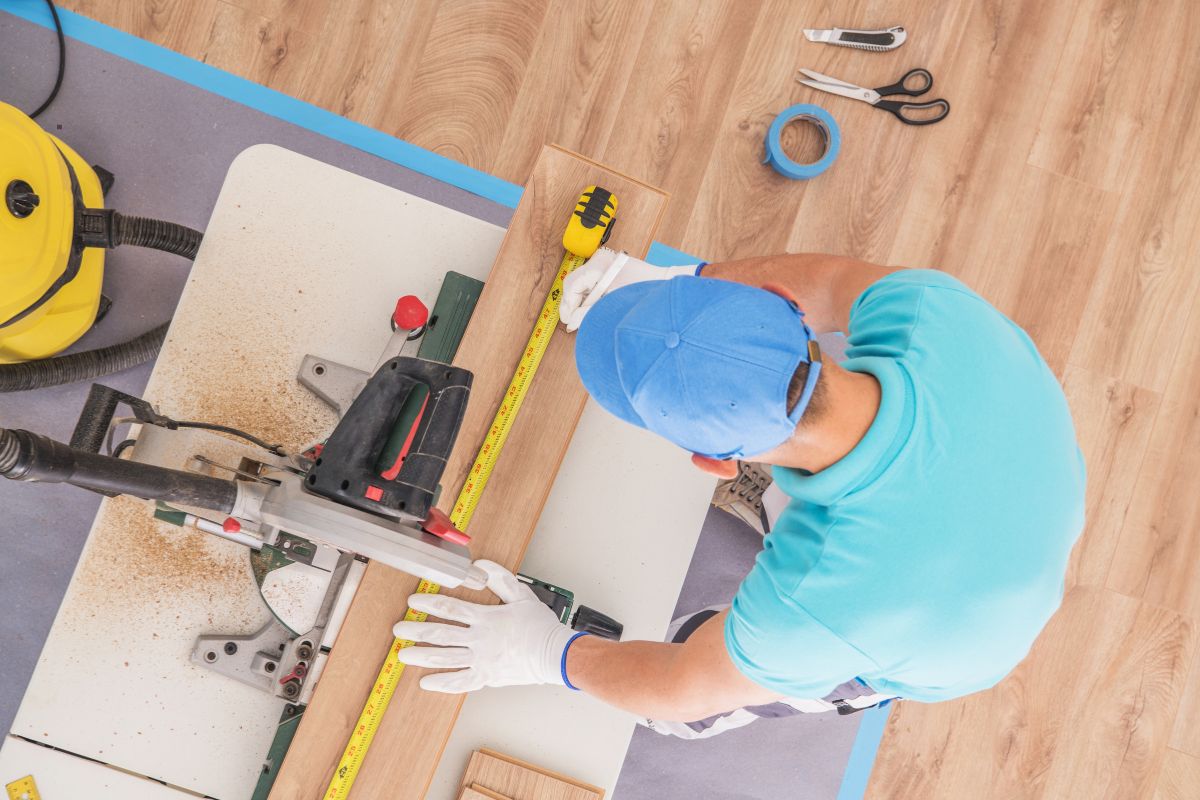
Figuring out how much you should pay for someone to install flooring can feel like a guessing game. Prices vary depending on the type of material, the size of your space, and whether you decide to go the DIY route or hire a pro. In 2025, flooring installation costs are all over the map, ranging from budget-friendly laminate to high-end hardwood. This guide breaks it all down so you can budget smartly and make the best choice for your home.
Key Takeaways
- Flooring installation costs in 2025 range from $1,531 to $4,861 for most homeowners, depending on the material and project size.
- DIY installation can save money but may not be worth the effort for complex materials like tile or stone.
- Professional labor costs vary widely, from $1 to $15 per square foot, depending on the material and job complexity.
- Additional costs like subfloor repairs, removal of old flooring, and custom installations can add up quickly.
- Choosing budget-friendly materials like laminate or vinyl can help keep your project within budget.
Understanding Flooring Installation Costs
Factors That Influence Pricing
When you’re planning a flooring project, costs can vary widely depending on several factors. The size of the area is a major determinant—larger spaces naturally require more materials and labor. The type of flooring you choose also plays a key role; for example, vinyl is generally cheaper to install than hardwood or tile. Labor costs vary too, ranging from $1 to $15 per square foot depending on complexity. Don’t forget additional expenses like subfloor repairs, underlayment, or custom cuts for oddly shaped rooms.
Average Costs by Material Type
Here’s a quick look at average flooring installation costs based on material:
| Flooring Material | Average Cost per Sq. Ft. (Including Labor) |
| Vinyl | $3 – $7 |
| Laminate | $3 – $13 |
| Hardwood | $6 – $22 |
| Tile | $7 – $20 |
| Carpet | $3 – $11 |
These figures can fluctuate based on labor rates and the quality of materials. For example, luxury hardwood or custom tile designs will push costs higher.
Regional Variations in Labor Costs
Where you live matters. Labor costs are typically higher in urban areas compared to rural locations. For instance, installing laminate flooring might cost $3 per square foot in a small town but jump to $6 or more in a big city. Local demand, cost of living, and availability of skilled professionals all contribute to these regional differences.
Pro Tip: Always get multiple quotes from contractors in your area to ensure you’re getting a fair price.
When budgeting for flooring, it’s essential to consider not just the material costs but also the labor and any additional fees that might come up. A little planning can go a long way in avoiding unexpected expenses.
Have more questions about flooring installation costs? Call us today for expert advice!
Comparing DIY and Professional Installation
Pros and Cons of DIY Flooring
Taking the DIY route for flooring can save you money upfront, but it’s not always the easiest or quickest option. Let’s break it down:
- Cost Savings: DIY projects typically eliminate labor costs, which can range from $4 to $8 per square foot for materials like laminate flooring. However, tools, materials, and potential mistakes can add unexpected expenses.
- Time Commitment: Be prepared to spend several weekends on the project, especially if you’re inexperienced. For high-traffic areas like kitchens or bathrooms, delays can disrupt daily life.
- Risk of Errors: Uneven subfloors, improper cuts, or poor adhesive application can lead to long-term issues. Fixing these mistakes later might cost more than hiring a pro in the first place.
When to Hire a Professional
Sometimes it’s best to leave it to the experts. Here’s when you should consider hiring a professional flooring contractor:
- Complex Materials: For intricate materials like hardwood or ceramic tile, professionals have the tools and expertise to ensure a flawless finish.
- Oddly Shaped Rooms: Installing flooring in rooms with irregular layouts can be tricky without experience.
- Subfloor Repairs: If your subfloor needs significant prep work, hiring a pro can save you time and ensure the foundation is solid.
Pro Tip: While professional installation costs more, it often includes warranties and faster completion times, giving you peace of mind.
Cost Differences Between DIY and Professional
Here’s a quick comparison of costs for a 200-square-foot room:
| Flooring Type | DIY Cost Range | Professional Cost Range |
| Laminate | $200–$800 | $1,600–$2,400 |
| Vinyl | $400–$1,400 | $1,200–$2,800 |
| Hardwood | $600–$2,000 | $2,400–$4,000 |
While DIY might seem cheaper at first glance, factor in the value of your time, potential mistakes, and the cost of renting or buying tools. Professional installation may be worth it for a polished, hassle-free result.
Breaking Down Costs by Flooring Material

Hardwood Flooring Costs
Hardwood flooring is a timeless choice, but it comes with a range of prices. On average, you can expect to pay $4 to $29 per square foot for materials and installation. Solid hardwood tends to be on the higher end of the spectrum due to its durability and natural appeal. Engineered hardwood is a more affordable alternative, typically falling between $3 and $10 per square foot. Keep in mind that additional costs, like finishes or subfloor preparation, can add to the total.
Vinyl and Laminate Pricing
Vinyl and laminate flooring are budget-friendly options that still offer style and durability. Vinyl flooring costs between $2 and $7 per square foot, while laminate ranges from $1.70 to $17 per square foot depending on quality. These materials are easy to install and maintain, making them a popular choice for DIY enthusiasts. However, professional installation may still be worth it for complex layouts or high-traffic areas.
Tile and Stone Installation Expenses
Tile and stone flooring are premium options that vary widely in cost. Ceramic tiles are generally more affordable, with prices ranging from $5 to $10 per square foot. Natural stone, such as marble or granite, can cost anywhere from $7 to $30 per square foot. Labor costs for tile and stone installations are typically higher due to the precision and time required. Expect to pay more if your project involves custom patterns or intricate designs.
Flooring costs can quickly add up, so it’s important to choose a material that fits both your style and budget. Balancing durability with cost-effectiveness is key to making a smart investment.
Additional Costs to Consider
Subfloor and Underlayment Expenses
Before installing new flooring, the condition of your subfloor can’t be ignored. If it’s uneven, damaged, or just plain unsuitable, you might need to repair or even replace it. This can add hundreds or even thousands of dollars to your project. On top of that, most flooring materials require an underlayment, which can cost between $3.40 and $5.30 per square foot. Underlayment isn’t just a nice-to-have—it helps with soundproofing, moisture protection, and insulation.
Removal and Disposal Fees
Got old flooring? Getting rid of it isn’t free. Depending on the material, removal costs range from $1 to $6 per square foot. Hardwood and tile are especially tricky to remove, and disposal fees might pile on top of that. If you’re replacing carpet, you might also have to factor in costs for removing the adhesive or tack strips.
Costs for Stairs and Custom Installations
Stairs are a whole different ballgame when it comes to flooring. Installing flooring on stairs is more labor-intensive and can cost significantly more per step. If your space has unique layouts or custom designs, expect to pay extra for the added complexity. Materials like tile might require specialized cutting tools, and intricate patterns can increase labor costs.
When budgeting, it’s always smart to add a cushion for these extra expenses. They’re easy to overlook but can make a big difference in your final bill.
Tips for Saving on Flooring Installation
Choosing Budget-Friendly Materials
When it comes to flooring, the material you pick plays a huge role in cost. Opting for laminate or vinyl can often give you the look of high-end materials like hardwood or stone but at a fraction of the price. Even within categories like hardwood or tile, there’s a wide price range, so don’t hesitate to explore different options. Remember, affordability doesn’t have to mean sacrificing style.
Timing Your Project for Discounts
Timing is everything. Contractors and suppliers may offer lower rates during off-peak seasons when demand is lower. For instance, scheduling your project during late winter or early spring could help you snag some great deals. Understanding hardwood floor installation costs can also help you identify periods when sales or discounts are more likely.
Negotiating with Contractors
Don’t settle for the first quote you receive. Get estimates from multiple contractors and use those numbers to negotiate. Many professionals are willing to work within your budget, especially if you’re upfront about your financial constraints. It’s also worth asking if they can bundle services, like removal and installation, for a better rate.
A little time spent researching and comparing prices can lead to significant savings on your flooring project.
Looking for ways to cut costs on your flooring installation? Our experts can help you find the best deals and strategies to stay within budget. Call us today for professional advice and a personalized quote!
How to Choose the Right Flooring Contractor

Questions to Ask Before Hiring
When you’re deciding on a flooring contractor, asking the right questions upfront can save you from headaches down the road. Here are a few essential ones to consider:
- Are you licensed and insured? This is non-negotiable. A licensed contractor ensures you’re working with someone who meets local requirements, while insurance protects you in case of accidents.
- What warranty do you offer? Professionals often provide a warranty for their work, which gives you peace of mind if something goes wrong.
- Do you handle preparation and cleanup? Some contractors include these services, while others may leave them up to you.
Checking Credentials and Reviews
Before signing any contracts, do a little homework. Look for online reviews and ratings from previous customers. Sites like home improvement forums or local directories can give you a good sense of a contractor’s reputation. Also, ask for references—you want to hear directly from people who’ve worked with them. Checking credentials, like certifications or memberships in professional organizations, can also indicate a contractor’s reliability.
Understanding Contractor Estimates
When you get estimates, don’t just look at the bottom line. A detailed estimate should break down costs for materials, labor, and any additional services. Ask if the quote includes potential extras, like subfloor repairs or disposal fees. A transparent estimate is a sign of a trustworthy contractor.
Choosing the right contractor isn’t just about price—it’s about finding someone who communicates clearly, delivers quality work, and respects your time and budget.
Budgeting for Your Flooring Project
Estimating Total Costs
Figuring out the total cost for your flooring project can feel like piecing together a puzzle. The main elements to consider are material costs, labor, and any extra fees for prep work like subfloor repairs. On average, expect to spend anywhere from $3 to $22 per square foot, depending on the material and complexity of the job. For instance, vinyl flooring might cost as little as $1.50 per square foot, while high-end hardwood could soar up to $29 per square foot. Don’t forget to factor in removal and disposal fees if you’re replacing old flooring.
| Flooring Material | Average Cost Range per Sq. Ft. |
| Vinyl and Linoleum | $1.50–$20 |
| Laminate | $1.70–$17 |
| Carpet | $3–$22 |
| Tile | $3–$30 |
| Hardwood | $4–$29 |
| Stone | $7–$27 |
Planning for Unexpected Expenses
No matter how well you plan, unexpected costs can sneak up on you. Maybe the subfloor is in worse shape than you thought, or you need custom cuts for tricky corners. A good rule of thumb is to set aside an extra 10–15% of your total budget for surprises. Trust me, it’s better to have a little cushion than to scramble for more cash mid-project.
Flooring projects often come with hidden costs, like fixing uneven surfaces or upgrading underlayment. Being prepared can save you a lot of stress.
Setting a Realistic Budget
Creating a budget isn’t just about crunching numbers; it’s about being honest with yourself. Start by listing your must-haves and nice-to-haves. Do you really need that imported marble tile, or will a quality laminate do the trick? Once you’ve nailed down your priorities, get a few estimates from contractors to see what’s possible within your price range. And hey, don’t be afraid to negotiate—every little bit helps!
- Step 1: Decide on your preferred flooring material and style.
- Step 2: Measure the area you need to cover to calculate square footage.
- Step 3: Get quotes from at least three contractors or suppliers.
- Step 4: Add a buffer for unexpected expenses and finalize your budget.
By planning ahead and staying flexible, you can create a flooring budget that doesn’t break the bank.
Wrapping It Up: What to Expect When Budgeting for Flooring
At the end of the day, figuring out how much to pay for flooring installation in 2025 comes down to a mix of your budget, the size of the space, and the type of flooring you want. Whether you’re going for something affordable like laminate or splurging on high-end hardwood, it’s all about balancing cost with what works best for your home. Don’t forget to factor in extras like underlayment, removal of old floors, and labor. And if you’re not up for the DIY route, hiring a pro might save you some headaches. Just take your time, get a few quotes, and make sure you’re clear on all the costs before diving in. Flooring is a big investment, but with a little planning, you can make it work without breaking the bank.
Frequently Asked Questions
What is the average cost of flooring installation in 2025?
In 2025, most homeowners spend between $1,531 and $4,861 for flooring installation. On average, the cost is around $3,163, but this varies based on material type, room size, and labor costs.
How much does it cost to install hardwood floors?
Hardwood flooring installation costs range from $6 to $18 per square foot, depending on the wood type and complexity of the job. For a 200-square-foot room, expect to pay between $1,200 and $3,600.
Can I save money by installing flooring myself?
Yes, DIY flooring can save you money on labor costs. However, it requires time, effort, and the right tools. Complex materials like tile or uneven subfloors may still need professional help.
What extra costs should I consider for flooring installation?
Additional costs to consider include subfloor repairs, underlayment, removal of old flooring, and disposal fees. These can add $1 to $6 per square foot to your total cost.
How long does it take to install new flooring?
The time varies by material. Laminate or vinyl can take a few hours for a single room, while hardwood or tile may take a few days due to preparation and installation time.
What questions should I ask a flooring contractor before hiring?
Ask about their experience, licensing, and insurance. Request a detailed estimate, timeline, and references from past clients. Also, inquire about warranties for the flooring and labor.
Determining the right price for flooring installation can be tricky, but we’re here to help! If you have any questions or need expert guidance, don’t hesitate to reach out to us. Our team is ready to assist you.

